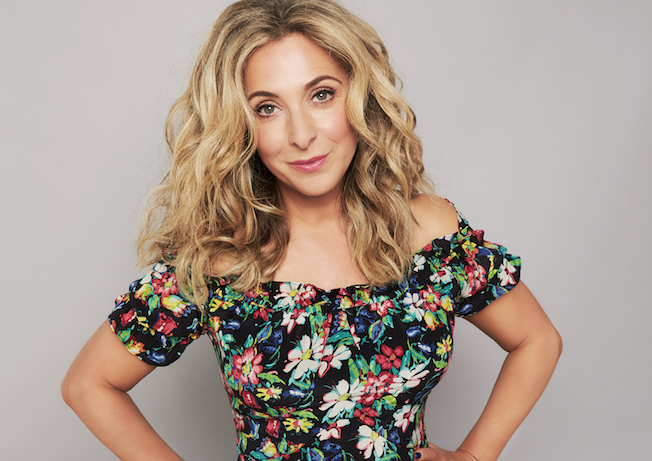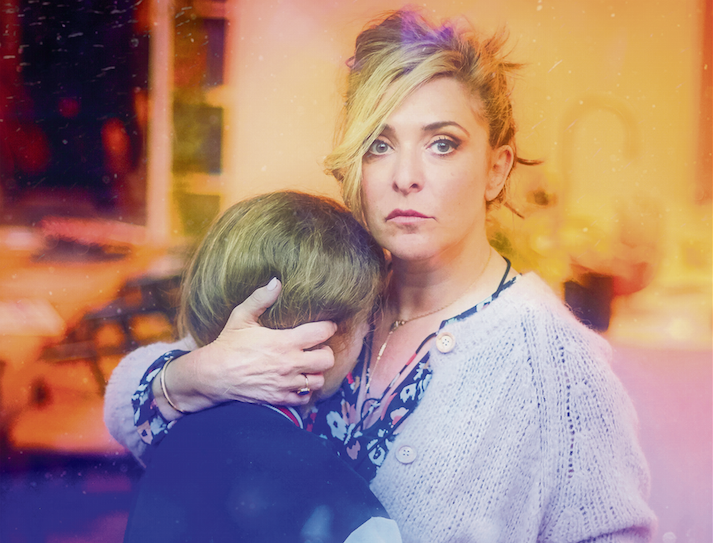Stage and screen actress Tracy Ann Oberman on her latest role, being trolled on Twitter and why Eastenders is like the golden age of Hollywood

Stage actress, Eastenders mega-bitch, social media warrior. With her voluminous blonde mane, practiced side-eye and reputation for being fearlessly outspoken, Tracy-Ann Oberman cuts an intimidating figure. We meet at a bijou cafe just off Hampstead Heath, the kind that sells £400 vintage chairs and is filled with brunching mums and toddlers. She breezes in, fashionably late, wearing a long floral dress and dazzling white sneakers, her hair wavy rather than in her trademark corkscrew curls.
“I’m on a little WhatsApp group with a load of fantastic women,” she tells me, sipping a glass of bright green juice. “We’re talking about some of the sexiest women on British television, and they’re getting their first grandma roles, even though their own children are under the age of 10. Women are having children later, their careers are longer, they’re sexy longer, they’re sexually active longer. But where are these women on television?”
You could make a decent case for Oberman, 53, being one of them. Her TV roles have included a stint as an anti-villain in Doctor Who, supporting roles in hit comedies Friday Night Dinner and After Life, and playing Chrissie Watts in Eastenders. She’s also run the gamut on stage, from being part of the Royal Shakespeare Company to appearing alongside Celia Imrie in the recent Pinter at the Pinter season, to taking on the lead in Fiddler on the Roof. She’s also found the time to star in more than 600 radio plays, and has now penned several of her own on the subject of golden-era Hollywood.
The term ‘strong female lead’ is bandied around a lot these days but Oberman defines a good role a bit differently. “I don’t mind whether a character is ‘strong’ or not,” she says. “I just want them to be well-written and rounded and interesting, not tacked on to the story of a male protagonist.”
So what roles is she itching to play? On TV, a period drama – “I’ve got the hair for it” – and on stage, a Chekhov. One arena that consistently offers up great female characters is soaps. Although she was only in Eastenders for a year and a half, Oberman had the honour of bumping off one of Albert Square’s most iconic characters, ‘Dirty’ Den Watts, in her role as black widow Chrissie. “When you murder one of soap’s hugest icons and bury him under the Queen Vic, the moniker follows you around – you’re always going to be ‘Eastenders actress,” she says. “It’s a badge of honour.”
Bravery is very important to me – not just sitting back and going with the flow
She makes the unlikely connection between Britain’s best-loved soap and the golden age of Hollywood cinema, of which she’s a huge fan (she says Now Voyager, Mildred Pierce and “anything with Bette Davis” are her favourites). “Those golden age of Hollywood films have always had fantastic female stories, and soap is kind of like that – you’re darting around a set a bit like you would on the Warners lot in a little buggy,” she says. This is the subject of many of the plays she writes for Radio 4, which tell the stories of icons like Davis, Joan Crawford and Doris Day.
Her latest project is new play Mother of Him, at the Park Theatre in London. Written by Evan Placey, it is the real-life story of a teenage boy under house arrest after committing a terrible crime, told from the perspective of his mother. “It’s about how single mothers are viewed, and their responsibility for their children,” she says. “As a mother, are you meant to love your child no matter what they do?”
One of the most striking things about Oberman is her confidence: you don’t get the impression that she has ever been intimidated by anyone, or anything. Has she always been this way?
She pauses for a long time. “I think I’ve always been like that,” she says eventually. “Bravery is very important to me, not just sitting back and going with the flow. It’s about sticking your head above the parapet, and I think I’ve always been brave enough to do that, but age has made it easier.”

A case in point is when Oberman spoke out about her past experience of working with high-profile theatre director Max Stafford-Clark, who was accused of making inappropriate sexual comments to two young actresses in 2017 – around the time the #MeToo movement was taking off in the US.
“I remember getting a message saying the narrative was going to be [that these were] silly snowflake girls who couldn’t let a 70-year-old-man have a laugh,” she says. “It really bothered me because this man had a reputation. I personally experienced it, I knew other people who had experienced it and I really didn’t want those young women to be thrown to the wall.”
This drive to stand up for what she believes runs through many of the things she’s involved in outside of acting. This stems in part, she says, from her family history, which includes Jewish relatives who died in the Warsaw Ghetto. “I was always very aware of family who didn’t make it out of Poland and Germany and it’s something we always discussed a lot in our family. It made me feel that I had to speak out, that nobody else was going to do it.”
A project she hopes to get off the ground soon is a version of the Merchant of Venice, set against the Oswald Mosley fascism of the 1930s East End and the Battle of Cable Street, in which Oberman would play a female Shylock.
“We’re working based on my family history, and my grandmother being an East End Jewish matriarch,” she says, folding her hands and smiling pointedly to signal that that’s all she wants to say on the matter.
Her grandparents were members of the Jewish Labour movement in East End, and this heritage played a part in her deciding to speak out against the Labour Party – of which she used to be a member – on Twitter, with regard to the ongoing and well-publicised allegations of anti-Semitism. “I kept thinking ‘is anyone going to come in from the Labour Party and speak out on it’, and nobody did, so I found myself saying my political thing.”
She was encouraged to join Twitter in the late noughties by her early-adopter friends David Baddiel, David Schneider and Omid Djalili. At first, she loved it. “It was like being at the wittiest cocktail party, you could talk to anybody, follow anybody. I never had a negative tweet sent my way.” She pauses. “Well, the odd dick pic,” she says, leaning towards me knowingly, “but you just block them and move on.”
But after speaking out online about the anti-Semitism crisis in the Labour Party, things took a turn, and she began to receive abusive messages. “Thousands of people jumped at me and it was intimidating and scary, but I thought ‘They want to drive me off and I won’t let them’.”
It was this experience that inspired her to start her podcast, Trolled, where celebrities and other public figures discuss their experiences of social media and being online. So far, the guests have included Gary Lineker, Luciana Berger and Al Murray.
She still thinks social media can be a force for good, though, and this is reflected in her new play, which is set before the social media era in 1998. The mother, Brenda, is portrayed negatively in the press due to her son’s actions and finds she has little control over her own image. “In 1998, when the papers wanted to write that you were a dreadful human being and you’d been doing x, y and z, they could get away with it because there was no other redress. Today Brenda could control her own story, she could have her own Twitter account.”
Thankfully Oberman has no such problem. Few public figures tackle the issues that count with such relish. Long may it continue.
Mother of Him is on now at the Park Theatre in Finsbury Park, until 26 October. To book go to parktheatre.co.uk